SELLING MAYFLOWER
After its $45 million price was announced, the listing of the University of Iowa’s Mayflower Residence Hall has garnered questions about the building’s future.

The Daily Iowan STAFF
Publisher | 335-5788
Jason Brummond
Summer Editors | 335-6030
Parker Jones, Alejandro Rojas
News Editor
Ellie Heeren
Visuals Editor
Cody Blissett
Arts Editor
Avi Lapchick
Opinions Editor
Evan Weidl
Sports Editor
Kenna Roering
Design Editor
Marandah Mangra-Dutcher
Digital Editor

Maddie Willis
BUSINESS STAFF
Business Manager | 335-5786

Debra Plath
Advertising Director/ Circulation Manager | 335-5784
Juli Krause
Production Manager
Heidi Owen
Cody Blissett/The Daily Iowan
Edited by Will Shortz No. 0531
ACROSS
1 [Wait until you’re home to click this!]
5 In which pictures of a bill + gates = a noted business executive
10 “Quiet!”
13 Shopify specialty
15 Simply be
16 Sweetheart
17 Longtime host of CNN’s “The Situation Room”
19 One ___ time

20 ___ Janney, Oscar winner for “I, Tonya”
21 More up to the task
23 What the “R” of AARP stands for: Abbr.
24 11-time P.G.A. Tour Player of the Year
28 Widely recognized
31 Ephron who directed “Sleepless in Seattle”
32 Walk or trot
33 Highball clinkers
35 Grammy-winning singer St. ___
37 Rap group with the classic 1986 album “Licensed to Ill” … or a description of 17-, 24-, 48- and 57-Across?
39 Chamber member
40 Start of a rodeo cry
41 Toss in a chip, say
42 Speedy horse breed
44 Critical times
48 The man in “Man vs. Wild”
51 President pro ___
52 “Midnight Cowboy” nickname
53 Give the right
56 Small thing to pluck
57 Wild West showman who lent his name to an N.F.L. team
61 Sherlock Holmes and Veronica Mars, for short
62 Up to now
63 Series opener
64 Boom sticks
65 Acquires
66 Tools with teeth
DOWN
1 Airport serving New York’s tristate area
2 Pinched
3 Be defeated by
4 Coffee shop freebie
5 Bring under control
6 No. after a phone number
7 Industry, briefly
8 Single-___ plastics (environmental concern)
9 This sucks!
10 Help for mom-and-pop shops, in brief
11 Terse one-star review
12 Newspaper tycoon who inspired “Citizen Kane”
14 Dumbbell figs.
18 Biblical figure with an unnamed wife
22 Came in just over par
25 Explode on the internet
26 Spooky-sounding lake
27 Shared with for feedback
29 They’re
BREAKING NEWS
Phone: (319) 335-6030 | Email: daily-iowan@uiowa.edu
CORRECTIONS
Call: 335-6030

Policy: The Daily Iowan strives for accuracy and fairness in the reporting of news. If a report is wrong or misleading, a request for a correction or a clarification may be made.
PUBLISHING INFO
The Daily Iowan (USPS 143.360) is published by Student Publications Inc., E131 Adler Journalism Building, Iowa City, Iowa 52242-2004. Periodiof March 2, 1879.
Steve Batterson
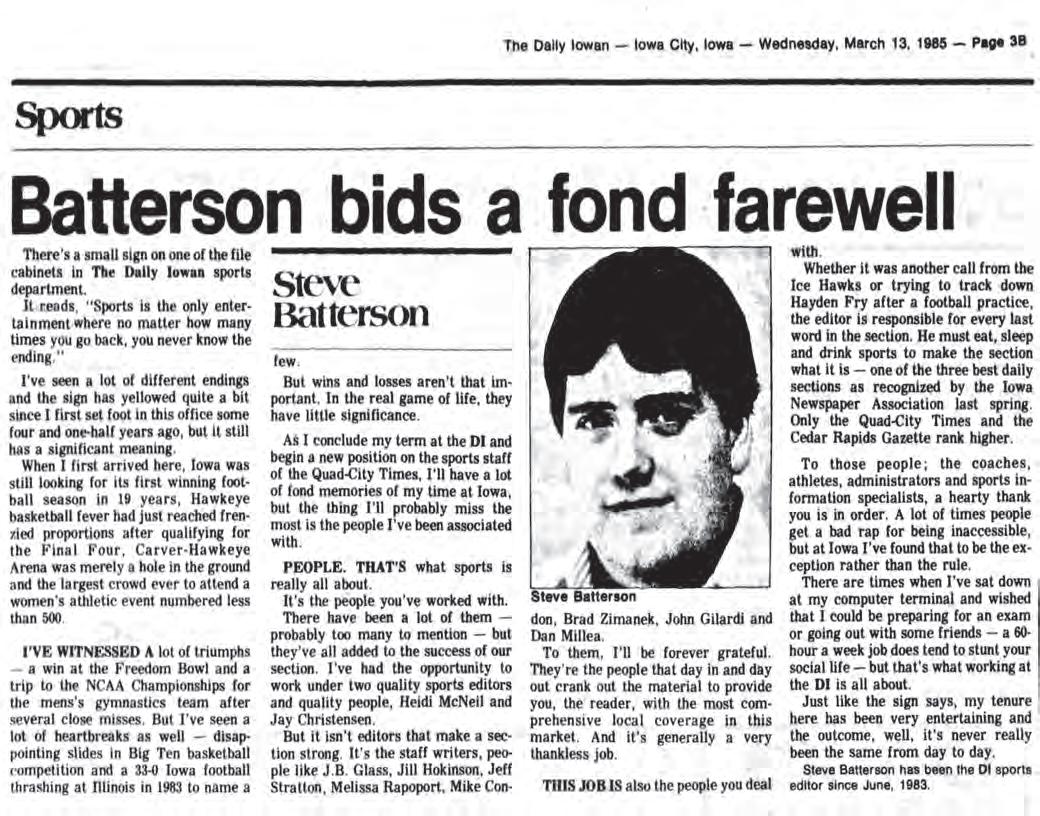


Selling Mayflower : Inside the $45 million
After its listing and $45 million price tag was announced, the future of the UI’s Mayflower Hall is still undecided.
Parker Jones and Hannah Janson Summer Editor and News ReporterFor the first time in four decades, Mayflower Residence Hall is back on the market, and it’s worth a pretty penny.
Iowa City real estate broker Jeff Edberg of Lepic-Kroeger Realtors, who has worked as a consultant for
the University of Iowa since 2009 and has 46 years of experience in the commercial real estate business, was tasked with brokering the sale of Mayflower.
The decision to sell the dorm came in February when the UI announced its plans to sell the building and construct a new dorm on the east side of campus with the
proceeds, indicating that Mayflower could be sold and closed by spring 2024. Edberg was then approached to assess the feasibil ity of putting the property on the market.
After seeking input from local and national developers, Edberg received a positive response, in dicating there would be strong interest in the property. The dorm received a listing price of $45 mil lion in June and an official listing on Realtor.com.
The building was originally constructed as a private dormito ry in 1968. The UI purchased the building in 1982 and renovated it in 1999, and again in 2009 after re pairing flood damage.
Rod Lehnertz is the senior vice president of Finance and Opera tions and university architect for the UI. In an email to The Daily Iowan, Lehnertz wrote that the UI elected to sell Mayflower, which primarily serves first-year under graduates, because it is the fur thest residence hall from the heart of campus.
“The Vice President for Student Life, the leadership of UI Housing & Dining, and UI administration discussed the possibility of selling Mayflower over the past several years. Mayflower primarily serves first-year undergraduate stu dents,” Lehnertz wrote. “First-year students have expressed a desire to live as close to the center of the undergraduate experience as possible.”
Edburg described the residence hall as boasting a unique configuration that sets it apart from traditional apartment buildings or hotels. The building provides various amenities on the first floor including a store, computer ac-
cess, lounges, classrooms, and an exercise room. The building also previously housed an indoor pool, which was removed and repurposed in the 1990s.


Edberg believes Mayflower has the potential to serve multiple purposes, such as housing students, workforce housing, low-income housing, or elder housing.
He noted that the UI is a steward of the state’s money, which is taxpayer money, so a fair price and the use of the building were important to consider.
“They’re not a private party looking necessarily for the top dollar,” Edberg said. “They’re looking
for a fair value, but also a good use is very important to them.”
Edberg’s valuation process involved considering three different approaches: a comparison of similar properties, an estimation based on construction costs, and a capitalization cost method. Because of the dorm’s distinct characteristics, Edberg said it proved challenging to find a sufficient direct comparison. Additionally, the building’s construction costs would differ drastically if it were built today, making a purely costbased estimate less reliable.
Through using the capitalization cost method, which assumes Mayflower would generate income like an apartment building or commercial property, Edberg was able to finalize the $45 million price. After deducting estimated costs like utilities and maintenance from the projected income — students’ room and board — a net operating income was calculated, indicating a return of over 13 percent.
“We took a look at economic models and searched our friend, the internet, for private dorm pric-

es, and looked at many communities and came up with income values,” Edberg said. “I took an aggregate of good estimates of what all the costs would be to run it, deducted that from the income, and came up with a net operating income. And that’s the holy grail in a capitalized cost analysis.”
This capitalization rate makes Mayflower an attractive investment opportunity when compared to luxury apartments in downtown Iowa City, which have capitalization rates of only four to five percent, he said.
The price was also determined through a collaborative effort between the university and the state, considering factors such as the building’s reputation and its significance as a landmark when entering Iowa City.
“When you come off the freeway, this is the gateway to Iowa City,” Edberg said. “It just fills your windshield. And so, you’re seeing Mayflower all the way down the street coming south and so you want this to be a landmark, and that’ll weigh into it too.”
Although no written offers have been received yet, Edberg said he has been engaging with credible investors and developers who have
shown some interest in the property. The ultimate goal is to find a buyer whose use of the building aligns with the city’s objectives and the
Mayflower would be economically unfeasible due to the building’s extensive use of concrete and steel. Fruin confirmed that the city
“The city would not permit a building of that size, scale, or height to be rebuilt on that site given the current city zoning code,” Lehnertz wrote. “The more likely outcome is for a third party to renovate the existing facility, which would allow the building to still fall under the zoning code for when it was originally built.”
university’s reputation, Edberg said.
“This is not an adversarial, but a collaborative effort that it will sell,” Edberg said. “We don’t know what the final price will be, but it will work for both the university and the buyer. And move on to the next chapter of the Mayflower.”
Iowa City City Manager Geoff Fruin echoed Edberg’s sentiment that the selling of the Mayflower will be a community effort and also stated that the city has not considered purchasing the dorm.
“We trust that as parties start to consider their interests they’ll reach out for a discussion on any type of city requirements for the property,” Fruin said. “There hasn’t been any discussion of the city purchasing that. It was never debated.”
Regarding the building’s future, Edberg believes demolishing
intends to maintain the building’s original purpose as a private dormitory because it adheres to the zoning requirements that were in effect when it was constructed.
He explained that the city expects buyers to rehabilitate, rather than demolish Mayflower.
“Keeping that housing supply on the market will be important,” Fruin said. “If someone wanted to purchase it and tear the property down, whatever was built back would be much smaller in scale under today’s regulations.”
Lehnertz also noted that the City of Iowa City provided the university with guidance on how the city might view a third party acquiring the site. He echoed Edberg and Fruin’s sentiment that the property would most likely not be demolished.
Edberg said he envisions the building continuing to serve as student housing on a private basis, or potentially accommodating workforce housing or elderly residents. Particularly in the case of senior housing, Mayflower presents opportunities for compatible uses with its elevators and adaptable floor plans, Edberg said.
Having known the building since its inception and being a UI alum himself, Edberg said he felt honored to be involved in the sale. He is optimistic about the building’s future and said he is confident that it will sell successfully.
“The challenge is to sell it and then have a use that we’re all going to be proud of that’ll be profitable for the buyer and healthy for the city,” Edberg said.
daily-iowan@uiowa.edu

When you come off the freeway, this is the gateway to Iowa City. It just fills your windshield.
— Iowa City real estate broker Jeff Edberg







The government shouldn’t decide abortion rights
Politicians shouldn’t be making people’s health decisions for them.
Since Iowa Gov. Kim Reynolds’ decision in December 2022 to reinstate a law that outlaws abortion in most cases after six weeks of pregnancy, and a judge’s subsequent
striking down of that bill, abortion has been a hot-button issue in Iowa. Politics simply do not have a place in governing an individual’s personal life. Laws impact the everyday lives and the fundamental rights of all people, and no one should be forced to do something with their body if they don’t want to.
This legislation was created in 2018, however it had been restricted by an injunction, meaning that the bill did not take place
in full effect. As a result, it never became law.
Since the U.S. Supreme Court determined that abortion was not protected in the Constitution last year with the reversal of Roe v. Wade, Reynolds sought to have this injunction lifted so the bill would not be restricted.
The “fetal heartbeat bill” would make it illegal for pregnant people to terminate the fetus, should the fetus exhibit a heartbeat during the pregnancy stages, which
was met with fierce opposition from pro-choice advocates.
On June 16, 2023, Reynold’s legislation went to the Iowa Supreme Court where it was struck down in a tied 3-3 decision.
One important aspect to consider is that some people do not find out that they are pregnant until they are 6 weeks pregnant. If this legislation had become an active law, many people would not be able to terminate their pregnancies
until it was too late.
The Iowa Supreme Court’s decision was met with outrage from Republican legislators. Many conservative leaders are advocating for the resignation of the justices who struck down this bill.
One conservative leader, Bob Vander Plaats, is advocating for the three justices to either be removed from power voluntarily or to be ousted. His belief is that the justices violated the Constitution,
even though last summer’s decision from the U.S. Supreme Court did not make abortion illegal across the country, but instead left the decision up to the states. Ultimately, it is for the best that politics take a back seat and not interfere with the personal freedom of someone’s life. The government has no business in forcing its citizens to make unwilling choices.
fouad-el-kerdani@uiowa.edu

The causes and need for affirmative action
Our country has a long and troubled history of racial inequity, and the restriction of affirmative action is a step back
Affirmative action in college admissions is a key tool on the journey to racial equity, and the removal of it has become yet another burden in the fight for justice.
This week, the Supreme Court ruled in favor of restricting the use of race as a factor in college admissions, ending a half-century-old practice.
In a world where we
have perfect racial equity in all aspects of society, affirmative action would not be necessary. However, that is just not the world we live in, and thus, affirmative action is a necessary step toward racial equity.
Nearly 100 years after the Declaration of Independence declared that all men are created equal in 1776, enslaved people were finally freed. Another 90 years passed before school segregation was struck down by the Supreme Court, and another decade after that before the Civil Rights Act was signed into law.
Affirmative action in college admissions helps put stitches in some of the wounds of injustice. Centuries of segregation in education and across all facets of society led to inequities that have deep and obvious effects today.
It is not a poor work ethic or laziness that causes the need for affirmative action; it is the poor opportunities caused by 250 years of racist laws and policies.
Because these communities have been historically marginalized and deprived of economic and educational opportunities, it becomes very
difficult to break the cycle of poverty and move upward socially.
Affirmative action helps this problem by uplifting people from these communities who do not receive the same opportunities as many of their peers. It is crucial that universities seek out students in marginalized communities who may not otherwise be provided the resources and knowledge to reach out to the universities.
Opponents of affirmative action may argue that these students are receiving “special treatment” and that it is unfair to students to can’t
be admitted based on affirmative action. However, society and education have been unfair to people of color in the entire history of the US.
Do not blame people who are trying to get an education and get out of poverty; blame racist legislators and businesspeople who encourage society to work against people of.
Education is one of, if not the best things anyone can utilize if they want to earn more money. According to the Association of Public and Land-Grant Universities, people aged 22-27 who do not have
bachelor’s degrees but did graduate high school have a median income of $30,000 per year. For people in the same age group with bachelor’s degrees, that number jumps to a median of $52,000 per year.
We have a long, long way to go before we achieve racial equity in any aspect of U.S. society, but affirmative action was a good start to achieving racial equity in education. The Supreme Court’s decision to rid it from our education system will hamper the fight for justice.
evan-weidl@uiowa.edu

After the Iowa Supreme Court tied 3-3, the “fetal heartbeat bill” was left permanently blocked, but it shouldn’t be up to the government to decide the fate of abortion rights for Iowans.Aaron El-Kerdani Opinions Columnist Evan Weidl Opinions Editor COLUMN
Arts & Culture Associate Professor Damani Phillips on being Black in jazz
UI Associate Professor Damani Phillips speaks in a Q&A interview about his experiences as the first Black man to receive a doctorate degree in jazz from the University of Colorado Boulder.
Avi Lapchick Arts EditorIn the week leading up to this year’s Iowa City Jazz Fest, The Daily Iowan spoke with Damani Phillips, a local jazz saxophonist and associate professor of African-American studies at the University of Iowa, about his experience as a Black jazz musician in Iowa City and as the first African-American man to earn a doctorate in jazz from the University of Colorado Boulder.
Phillips performed at Jazz Fest on Sunday, July 2, alongside Cassius Goens on the drums, Brandon Meeks on bass, and Steve Shanley on piano.
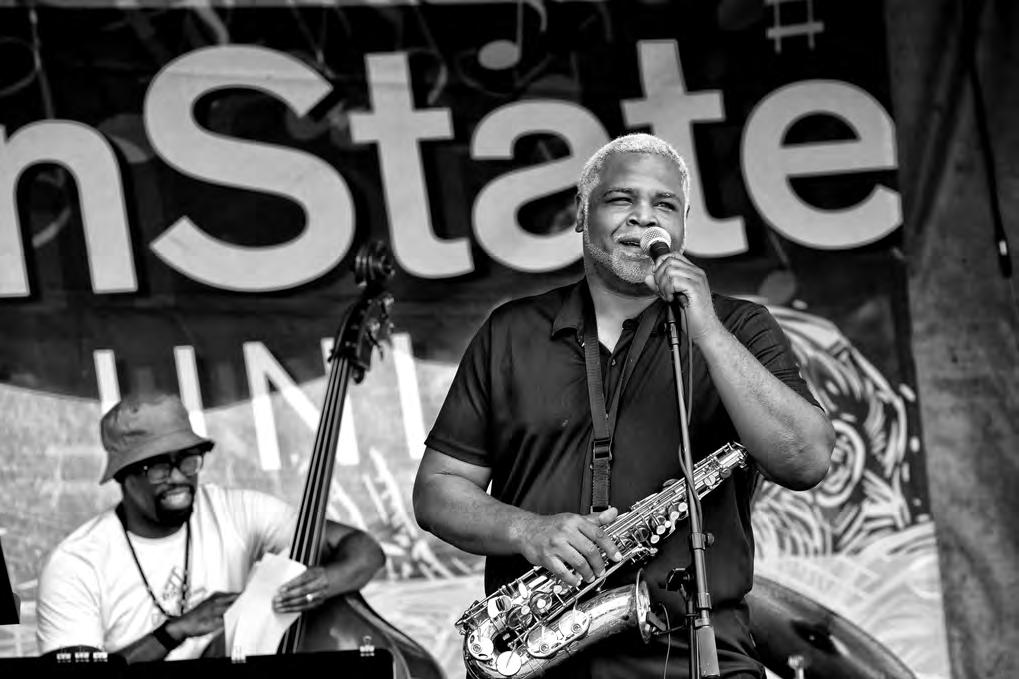
DI: You have been learning different musical instruments — specifically the saxophone — since you were 10 years old. Why the saxophone?
Damani Phillips: Well, I started playing the saxophone because my older brother chose saxophone, and I wanted to be like my older brother, but he had quit playing and I took off like a rocket. I knew really early on what I was supposed to do. My parents weren’t as happy about that as I was, but they eventually realized I was meant to do music. However, I didn’t play any jazz until the year 2000. I was all classical music and eventually had
an epiphany in terms of the practicality of playing classical saxophone. Then, I kind of stumbled into jazz and fell in love with it right away. You always hope your journey is a straight line but, more times than not, it never ends up working out that way.
DI: I’ve noticed there are so few opportunities in Iowa City to experience jazz besides the annual summer festival. As a resident of Iowa City and a musician, what does the annual Jazz Festival mean to you, especially after the loss of The Mill?
Phillips: A big part of the jazz program that we’re building here at the school of music is focused on getting students out and playing in front of people. So, we are actively trying to cultivate new opportunities here in Iowa City so that jazz isn’t so far and few between. After The Mill closed down during the pandemic, we were without a venue that was receptive and open to jazz music. We’ve started to cultivate new relationships with different venues around the city so that jazz isn’t such a difficult thing to track down…
[Jazz Fest] is one of the longest-standing festivals in the state so it is fantastic to have to know that we’ve got a festival in our city where they can bring in a crowd. It’s always a beautiful thing
to have a festival of that stature and of that quality right here in your backyard, but it’s a once-a-year thing, so we have to make sure that we maintain and capitalize on that.
DI: Can you talk more about the cultural erasure you experienced while studying jazz in academia?
Phillips: When jazz was allowed into the academy, the academy wanted nothing to do with it. It fought very hard to exclude jazz from the equation. Eventually, it accepted jazz music only as a
commodity that drew people in yet didn’t let in any of the people who were responsible for creating it. The academy likes to break things down into digestible bits of things that can be concretely graded as “A,” “B,” “C,” “D,” and “E,” but the real spirit of jazz lives in the intangibles and the essence of emotional expression. In the Black community, nobody cares about whether or not you played the right note over this scale. It’s the question of, “Was it successful in expressing that emotion?” This is the very core of what makes the music unique and separates it
from everything else on the planet, and those unique elements are largely coming from African American music culture. So, a lot of times you’re being taught a hollow shell of what jazz is and leaving out the very things that are at the soul of what makes the music.
DI: When you teach your curriculum, how do you bridge that gap?
Phillips: It’s really simple. The history of jazz and Black music culture are fused together, so I speak to my students so that they understand
the music from a unique perspective that haven’t really heard much before with the hope that they move forward. I explain to them that people who aren’t trained musicians couldn’t care less about them playing a sharp nine over top of a dominant seven flat — they’re not celebrating that, but they’ll understand that emotional angst that you generate. It’s a reintegration of the music so that the music and the culture are one and the same which, from the beginning, is how it’s always been.
olivia-lapchick@uiowa.edu
Saxophones, double basses, and scatting galore — Jazz Festival in Iowa City
The 32nd annual Iowa City Jazz festival brought musicians, food, and vendors together.
Zhenya Loughney Aspen DeGroot Arts ReportersWith clearer air after a hazy week, community members of Iowa City gathered on the sunny lawns facing Iowa Avenue to listen to a diverse array of jazz musicians — from solo songstresses to high school ensembles to Grammy-nominated trios — all celebrating the 32nd annual Iowa City Jazz Festival.
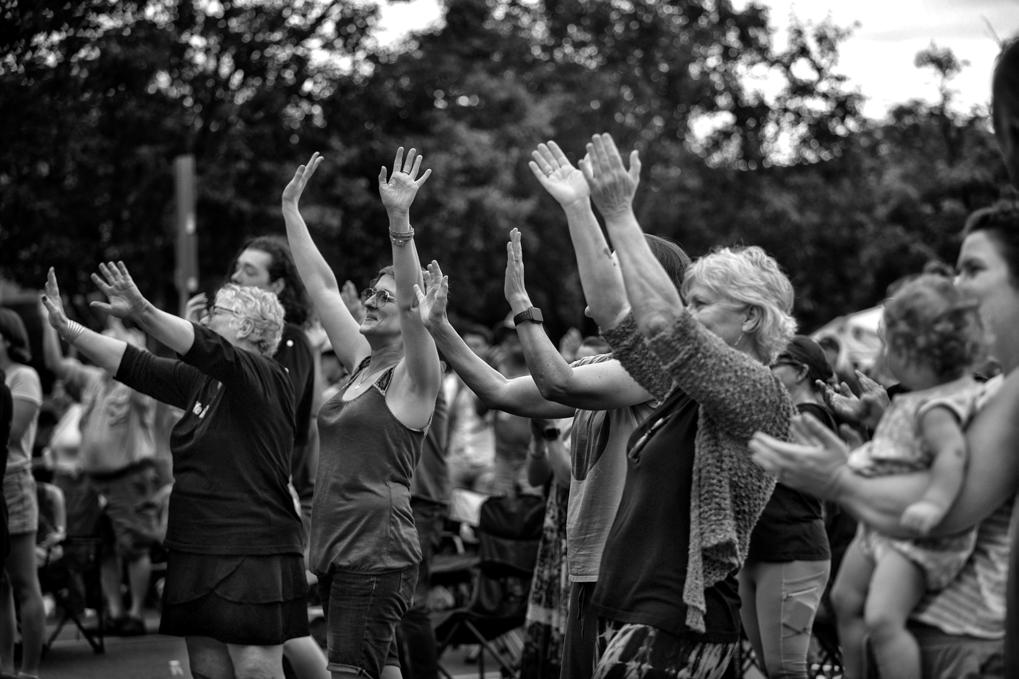
Iowa City Jazz Festival took place June 30 to July 2. The annual event affords jazz appreciators an opportunity to experience live music, food trucks, and vendors in their own community. For some musicians, the chance to play at the festival is a dream.
Mike Conrad, a pianist in the Jon Ailabouni Quintet — the mainstage opener — and Christopher Mers’ Shorter Stories, said that his desire to play goes all the way back to childhood.
“I love this festival. I grew up going to it,” Conrad said. “I’ve been coming to the festival for 20 years, and so now it’s really fun to be a performer.”
Conrad said many of the songs performed with the quintet were written during the COVID-19 pandemic, a stark reminder that these streets now happily filled with jazz lovers were once
barren due to quarantine regulations.
“The music is centered around some of those themes of isolation and loneliness or trying to find hopeful stuff in the midst of all that. Some of it was kind of a reaction to the news,” he said. “It’s been a joy to try to bring compositions to life. It’s really beautiful and emotionally charged.”
Opening the festival’s sidestage was Kiersten Conway, a student at the School for Music Vocations in Creston, Iowa. Accompanied by bass player Ethan Dix, Tim Crumley on drums, and Joel Foreman on the keys, Conway scatted in both English and Bossa Nova-style Portuguese.
“I’m really loving vocal jazz and performing. I’m getting an associate [degree] in vocal performance, music performance, and professional music in general,” Conway said. “I want to continue performing and writing music and arranging.”
Jazz as a genre emerged in the 19th century from the Congo Square in New Orleans where enslaved people would come together to share music. Jazz can include Cuban rhythms, hymnal lyrics, field chants, and more. While the genre’s overall demographic skews slightly older, there are still many young people in the audience moved by the music.
Jenna Anderson, a second-year music major at the University of Iowa, attended the Jazz Festival three times over the years, but she is just as excited as her first time.
“I’ve had friends that perform here, so it’s always fun to see them doing what they love. It’s really fun to see what the community is doing in the jazz world,” Anderson said.
There was a variety of vendors lining the streets, selling anything from jewelry and clothing to Kenyan artwork, even caricature
portraits. Each business offered a unique experience to learn not only about the products they sell, but the people who run them.
Jim Piccoli and Sharon Piccoli, vintage jewelry vendors, said that the Jazz Festival is one of their favorite events to show their products.
“This festival is one of the best. We do shows all over Michigan [and] Florida,” Sharon Piccoli said. “This one is first class. They treat the vendors great. Everything is orga-
nized ahead of time, and we love it.”
Joan Namacheno, co-owner of the jewelry vendor Josina’s Handmade, said her love of selling primarily handmade Kenyan artwork across the U.S. brings her immense joy.
“These products are handmade by my family back in Kenya. A women’s group in Uganda made these baskets,” Namacheno said. “I’m so proud to be sharing my culture with other people through the festival.”
Iowa City and jazz have a long history together. Jazz is unique in that, after World War II, it migrated outside of hubs like Chicago and New York City to smaller, middle-country cities like Iowa City.
Jazz is year-round in Iowa City, not only in the bronze form of a statue titled “Jazz” in the Ped Mall downtown, but in many local venues, the UI’s School of Music, and the heart of downtown. daily-iowan@uiowa.edu
Iowa City celebrates 2023 jazz festival

The second day of the 2023 Iowa City Jazz Festival took place downtown featuring tents with food, artists, and other vendors, capped off by a fireworks show in the evening.


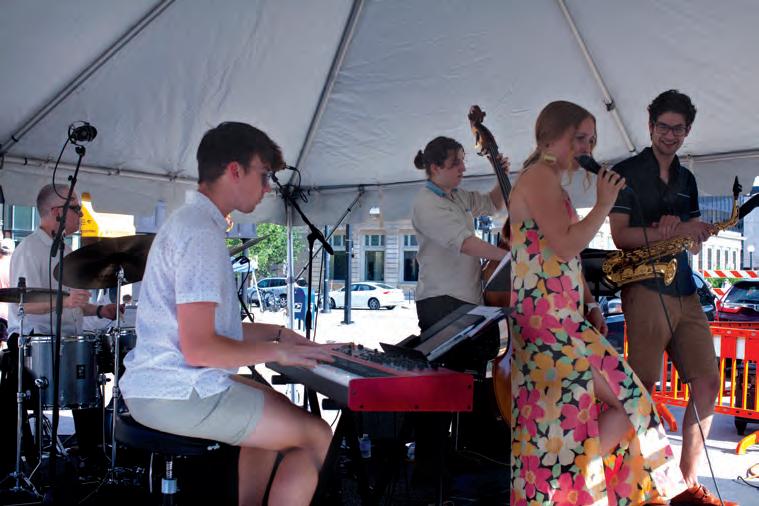
Home state reppin’
With three years of eligibility remaining, Anthony Watts is eager to represent his home state in 2023.
I started off in high school as a late bloomer, so I didn’t have a lot of attention,” Watts told The Daily Iowan. “I was anticipating a couple of calls just because I thought I got a little better from high school. The Hawkeyes were one of the calls I was hoping to get early.”
In high school, Watts knew he always wanted to represent the state of Iowa and play for the Hawkeyes. So, when he was given a chance to be recruited again, the decision to play for Iowa was easy.
“Even in high school, it was something I always wanted to do — play for the Hawkeyes and represent the state,” Watts said. “I feel like playing for your home state is different. You take a little more pride in what you are doing and how you represent yourself on the field.”
Jake Olson Sports ReporterThe Iowa baseball team added another transfer to their roster this offseason

— right-handed pitcher Anthony Watts from Creighton University.
On June 22, Watts posted on his Twitter that he would commit to head coach Rick Heller’s Hawkeyes to complete his final three years of
eligibility.
The Clive, Iowa, product joins two other portal pickups in left-handed pitcher Brent Hogue from Oklahoma State University and right-handed pitcher Reece Beuter from Dallas Baptist University.
Before continuing his career on the diamond at Creighton, Watts played for Waukee Northwest High School.
While playing for the
Wolves his senior season, Watts managed a 9-1 record with a 1.20 ERA. He held hitters to a .167 batting average and struck out 121 men at the plate in 62 innings pitched.
He was named Iowa Pitcher of the Year and rated the number three right-handed pitcher in the state according to Perfect Game.
Watts didn’t have a lot of attention coming out of high school and called himself a
“late bloomer.” When he arrived in Omaha, he slotted himself right into a weekend starting role.
With the Bluejays, Watts had a 2-3 record and a 5.15 ERA. In 43 and two-thirds innings pitched, Watts recorded 23 strikeouts while holding opponents to a .265 batting average.
After his freshman season in Omaha, Watts officially entered his name into the trans-
fer portal and earned attention from highly successful programs right away. Besides Iowa, Baylor, TCU, and Washington State showed interest in Watts.
But Iowa was the only school Watts visited, and before lining up any visits with other schools, Watts made his commitment to the Hawkeyes.
“[College] was a lot different than high school because
Watts is looking to slide himself into a weekend rotation spot in the 2024 season but remains open to anything that the pitching staff needs him to do for the team.
“I’m pretty open to anything,” Watts said. “I know that a Sunday role could be open, but at the same time, talking to coaches there are a lot of innings in the bullpen too. Somebody needs to step up and take those innings too.”
jake-olson@uiowa.edu
From baskets to birdies
Iowa women’s basketball star Caitlin Clark to play in PGA Tour’s John Deere Classic Pro-Am on July 5.
Matt McGowan Sports ReporterIt’s been no cruel summer for Iowa women’s basketball player Caitlin Clark.
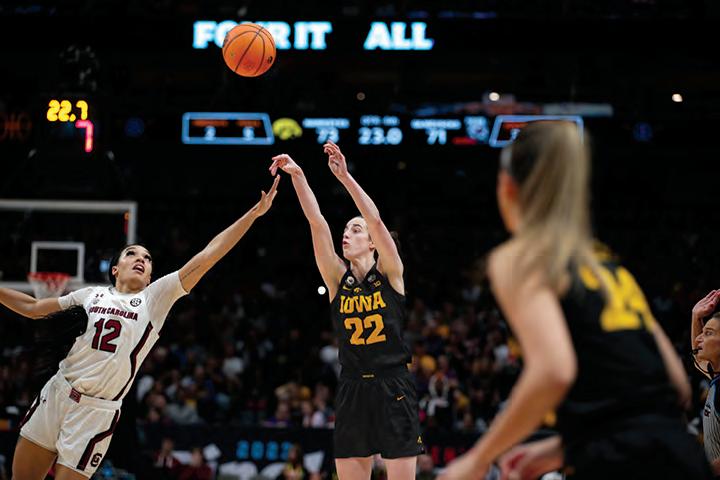
The Hawkeye guard not only attended a Taylor Swift concert in Minneapolis but was also on stage in Los Angeles to receive the 2023 Honda Cup as the top women’s collegiate athlete.
Now, Clark’s next stop is the green.
On July 5, Clark will join U.S. Ryder Cup team captain and Iowa native Zach Johnson at TPC Deere Run golf course in Silvis, Illinois, to play in the PGA Tour’s John Deere Classic Pro-Am.
Clark has been an avid golf fan since she was young and received a set of pink clubs from her father as a birthday gift.
Her Twitter account features plenty of golf discussion, from Michael Block’s run in the U.S. Open to Rose Zhang’s dominance in the LPGA.
In April, Big Ten Network filmed Clark playing a twoon-two scramble at Finkbine Golf Course in Iowa City. Just two months later, Clark will have an in-person audience of thousands.
“[The crowd] should definitely stay behind me just in case anything goes wrong,” Clark said at a virtual press
conference on June 28. “I definitely think when I step on the first tee, I will probably be shaking and really nervous … it’s a little different field, but it still has that environment that’s really fun and competitive.”
As of the press conference, Clark said she had never played Deere Run but plans to get a few practice rounds there in the future. She already received guidance from former Iowa basketball player Kris Murray, who played the course on June 22 before the NBA Draft.
On the hardwood, Clark is known for her highlight-reel passes, averaging 8.6 assists last season. When it comes to golf, Clark said she prefers playing by herself, citing her lack of patience and desire for a fast tempo.
Even though both sports are played at vastly different paces, Clark maintained that mental focus was most important.
“You have to keep your focus from shot to shot,” Clark said. “In both sports, there’s going to be things that don’t go your way. It’s just how you respond to that. And I think that’s how I’ve matured over the past year is understanding that … trying to turn it, make it go a different way, make it better.”
Clark said her Sundays usually feature the final
round of a golf tournament on TV. Calling herself a fan of Zhang, Rory McIlroy, and Jordan Spieth, Clark said her golf demeanor is rather calm.
“I’ve never broken a club, nothing like that,” Clark said. “Probably because they’re too expensive, and I don’t have to buy new ones … I definitely get frustrated if I have a couple bad shots in a row. But like I said, that’s just
part of golf.”
Zach Johnson was born in Iowa City and raised in Cedar Rapids. In the June 6 edition of the Hawkeye Report Podcast, Johnson said he was looking forward to getting to pick Clark’s brain on basketball.
Clark is just as excited to hear from Johnson.
“For over four hours to basically get a lesson from Zach
Johnson, are you kidding me?” Clark said. “I’m going to be asking him everything.”
Despite all her passion for the game, golf is still just a part-time hobby for Clark. She admitted that she will miss a team lift when she plays in the Pro-Am but said head coach Lisa Bluder will let her make it up later.
Right now, Clark is just grateful to live out her wild-
est dreams.
“I’m an OK golfer, not like anything out of this world,” Clark said. “But if I had more time to play, I’d probably be a little better. I think the biggest thing is just going to have fun. This is a once-ina-lifetime opportunity. Who knows if I’ll ever be able to do this again.”
matthew-r-mcgowan@uiowa.edu
